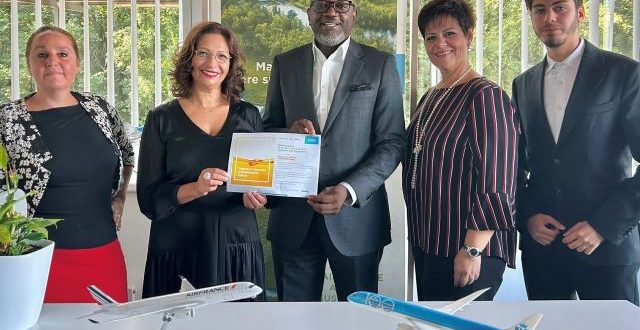L-R Country Sales Director Switzerland & Liechtenstein, Air France-KLM, Armelle Comte, Administrative Manager, Sahara Energy International, Geneva, Angie Nesurini, Director, Sahara Group, Kola Motajo, Head, HR, Sahara Energy International, Anna Valasidi and Corporate Account Manager Switzerland & Liechtenstein at Air France-KLM, Yanis Yazbek at the presentation of Air France-KLM “Official Partner” certificate to Sahara Group in in recognition of Sahara’s commitment to promoting Sustainable Aviation Fuel across the globe.
Leading energy and infrastructure conglomerate, Sahara Group, has partnered with Air France-KLM to promote clean travel through its recent investment of global business travel miles into Air France-KLM’s Sustainable Aviation Fuel (SAF) program.
This investment by Sahara Group will result in the offset of 20 tons of CO2, contributing to the global fight against climate change.
Facilitated by Sahara’s affiliate in Geneva, Sahara Energy International, the gesture has earned Sahara an official partner certification in the Air France-KLM corporate SAF program, reinforcing Sahara Group’s ongoing commitment to sustainability and its proactive decarbonization efforts.
Sustainable Aviation Fuel (SAF) is derived from renewable sources such as waste oils, agricultural residues, and non-fossil CO2. As a cleaner substitute for conventional jet fuel, SAF reduces emissions by at least 75% compared to fossil fuel, enabling airlines to significantly cut their carbon footprint.
Speaking at the Air France-KLM Office in Geneva, Kola Motajo, Director at Sahara Group, highlighted that investing in SAF helps reduce aviation-related emissions, thereby contributing to the global effort to combat climate change.
According to Motajo, SAF fosters innovation in renewable energy and supports the transition to more sustainable aviation practices. “Our partnership with Air France-KLM is a testament to how we are making a difference by flying sustainably. Investing in SAF is not just a move towards reducing our carbon footprint but also an investment in the future of aviation. We are excited about the positive impact this will have on the environment and the aviation industry,” he said.
Commending Sahara Group for the investment, Yanis Yazbek, Account Manager at Air France-KLM, stated, “This is a significant step forward from Sahara Group. As a key and trusted partner for Air France-KLM, they are a pioneer in the decarbonization of aviation. Today, SAF is the most realistic and concrete solution for reducing aviation CO2 emissions. This investment underscores the importance of supporting innovation and new technologies to make travel greener. With partners like Sahara Group, Air France-KLM can continue to invest in research, development, and production while securing our SAF supply for the years to come.”
Reinforcing the uniqueness of the partnership, Ejiro Gray, Director of Governance and Sustainability, remarked, “Sustainability is at the core of our operations, and this initiative aligns with our quest to achieve net zero carbon emissions by 2060. By supporting the SAF program, we are taking a significant step towards achieving a cleaner and greener future.”
Foluso Sobanjo, Head of Downstream, Africa at Sahara Group, added, “Sahara’s track record of sustainable operations is evidenced by several International Organization for Standardization certifications. As a market leader in aviation fuel business, we are delighted to be recognized as an official partner of the Air France-KLM corporate SAF program. This collaboration is an exciting opportunity to contribute more meaningfully towards a cleaner and safer aviation sector.”
Globally, the aviation industry is responsible for approximately 2.5% of total CO2 emissions. The adoption of SAF is a critical step towards achieving net-zero emissions by 2050, a goal supported by many airlines and industry stakeholders. It is estimated that with increased investment, 500 million metric tons of SAF could be produced annually from advanced and waste feedstock by 2030.








